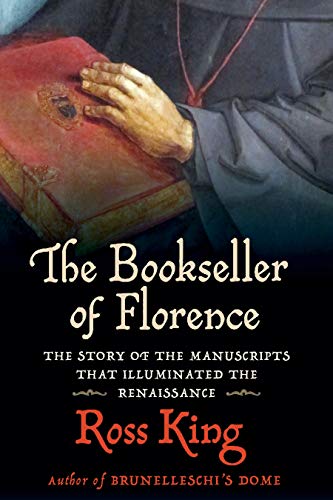All Categories


The Bookseller of Florence: The Story of the Manuscripts That Illuminated the Renaissance
Share Tweet
Get it between 2024-12-31 to 2025-01-07. Additional 3 business days for provincial shipping.
*Price and Stocks may change without prior notice
*Packaging of actual item may differ from photo shown
- Electrical items MAY be 110 volts.
- 7 Day Return Policy
- All products are genuine and original
- Cash On Delivery/Cash Upon Pickup Available








About The Bookseller Of Florence: The Story Of The
About the Author Ross King is the award-winning and bestselling author of Brunelleschi’s Dome, Michelangelo and the Pope’s Ceiling, The Judgment of Paris, Mad Enchantment, Leonardo and the Last Supper, and Machiavelli: Philosopher of Power, among other books. He and his wife live in Woodstock, Great Britain. Product Description The Renaissance in Florence conjures images of beautiful frescoes and elegant buildings—the dazzling handiwork of the city’s skilled artists and architects. But equally important for the centuries to follow were geniuses of a different sort: Florence’s manuscript hunters, scribes, scholars, and booksellers, who blew the dust off a thousand years of history and, through the discovery and diffusion of ancient knowledge, imagined a new and enlightened world. At the heart of this activity, which bestselling author Ross King relates in his exhilarating new book, was a remarkable man: Vespasiano da Bisticci. Born in 1422, he became what a friend called “the king of the world’s booksellers.” At a time when all books were made by hand, over four decades Vespasiano produced and sold many hundreds of volumes from his bookshop, which also became a gathering spot for debate and discussion. Besides repositories of ancient wisdom by the likes of Plato, Aristotle, and Quintilian, his books were works of art in their own right, copied by talented scribes and illuminated by the finest miniaturists. His clients included a roll-call of popes, kings, and princes across Europe who wished to burnish their reputations by founding magnificent libraries. Vespasiano reached the summit of his powers as Europe’s most prolific merchant of knowledge when a new invention appeared: the printed book. By 1480, the king of the world’s booksellers was swept away by this epic technological disruption, whereby cheaply produced books reached readers who never could have afforded one of Vespasiano’s elegant manuscripts. A thrilling chronicle of intellectual ferment set against the dramatic political and religious turmoil of the era, Ross King’s brilliant The Bookseller of Florence is also an ode to books and bookmaking that charts the world-changing shift from script to print through the life of an extraordinary man long lost to history—one of the true titans of the Renaissance. Review Praise for The Bookseller of Florence: “If you want to celebrate the place that bookmaking and bookselling still have in our lives, notwithstanding all those hours captive to the digital glimmer, you could do a lot worse than immerse yourself in Ross King’s rich history of Vespasiano da Bisticci, ‘the king of the world’s booksellers,’ in 15th-century Florence . . . Though Vespasiano himself was the author of a collection of biographies of ‘illustrious men,’ the real pleasure of King’s book is its detailed evocation of the physical grind of bookmaking . . . What you will find in abundance here is a historical celebration of the Greek humanist Cardinal Bessarion’s belief that books ‘live, they converse and speak with us, they teach us, educate us, console us.’ Painfully deprived as we have been of the immediate joys of friendly chatter and animated argument, have we ever valued the company of books more dearly?”—Simon Schama, New York Times Book Review “A marvel of storytelling and a master class in the history of the book, explaining sometimes arcane bookmaking processes in clear and coherent language while lending an easy touch to otherwise confounding historical turmoil . . . A dazzling, instructive and highly entertaining book, worthy of the great bookseller it celebrates.”—Ernest Hilbert, Wall Street Journal “[A] delightful, immersive history of books and bookselling in the heart of the Renaissance . . . Engrossing and meticulously researched . . . As this is a book about books, Ross wrangles myriad details about their creation, including producing parchment, inks, illuminations, bindings, movable type and paper (sometimes from the wardrobes of Black De




 (1)
(1)













